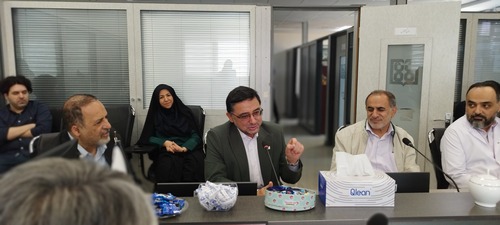Specialized Seminar on Artificial Intelligence Activities at the Radiology Research Center with the Presence of the President of Tehran University of Medical Sciences and Imam Khomeini Hospital Complex
n celebration of National Teachers' Day, a special meeting was held at the Radiology Research Center of Tehran University of Medical Sciences (TUMS) with the presence of senior officials from TUMS and Imam Khomeini Hospital Complex. During the session, the Center presented its recent scientific and research achievements, with a particular focus on advancements in artificial intelligence. The attendees highlighted AI’s pivotal role in the future of medical education and patient care, expressing readiness across institutions to collaborate on infrastructure, consulting, and localization of AI technologies. Key developments such as the implementation of the PACS system, the establishment of a radiology journal, and the Center’s knowledge-based initiatives were recognized as vital contributions to the country’s scientific progress. The event concluded with an appreciation ceremony honoring several distinguished members of the Center.

Tehran University of Medical Sciences (TUMS) Radiology Research Center held a specialized symposium on Saturday, May 4th, in honor of National Teachers' Day. The event brought together senior officials from TUMS and Imam Khomeini Hospital Complex, along with faculty members, researchers, and staff of the Center for Advanced and Minimally Invasive Radiology, to discuss cutting-edge scientific advancements—particularly in artificial intelligence (AI) in radiology.
Notable attendees included Dr. Rais-Karami (President of TUMS), Dr. Rostamian (President of Imam Khomeini Hospital Complex), Dr. Sarkar (Head of the Institute for Advanced Medical Technologies), Dr. Momeni, Dr. Hashemi, Dr. Torabi, Dr. Ghannati, and Dr. Firooznia.
Dr. Ghannati opened the session with a comprehensive report on the Center’s achievements, highlighting scientific publications, research projects, and ongoing AI initiatives. He also paid tribute to Dr. Vesal’s pioneering role in founding Iran’s first specialized radiology journal.
Dr. Sarkar commended the Center’s leadership in AI-driven radiology and affirmed his institution’s readiness to support related infrastructure and consultancy efforts. Dr. Rostamian emphasized the strategic importance of the Imam Khomeini Hospital Complex in national healthcare and pointed to the implementation of the PACS (Picture Archiving and Communication System) as a milestone in diagnostic and treatment enhancement. He called for broader application of AI technologies across the hospital system.
Dr. Rais-Karami stressed the transformative power of technology in healthcare and described AI as a critical enabler for future policy and practice. Dr. Hashemi addressed the imaging sector’s equipment challenges and announced new support commitments to enhance the national referral system. Dr. Firooznia emphasized the launch of a specialized radiology journal as a key step in strengthening academic exchange and mitigating brain drain.
Continuing the session, Dr. Ghannati warned of the financial loss associated with the migration of medical experts and advocated for investment in next-generation technologies such as stem cells and knowledge-based enterprises with international reach. He described AI as a vital tool for resisting sanctions and improving healthcare delivery.
Dr. Torabi presented a report on the hospital’s AI integration roadmap, identifying two major obstacles: inadequate infrastructure for machine learning implementation and the need to fully localize AI solutions to suit Iran’s healthcare landscape.
The event concluded with a recognition ceremony honoring Dr. Shakiba, Dr. Jalali, and Ms. Ghavami for their significant contributions to the Center’s progress.













comment